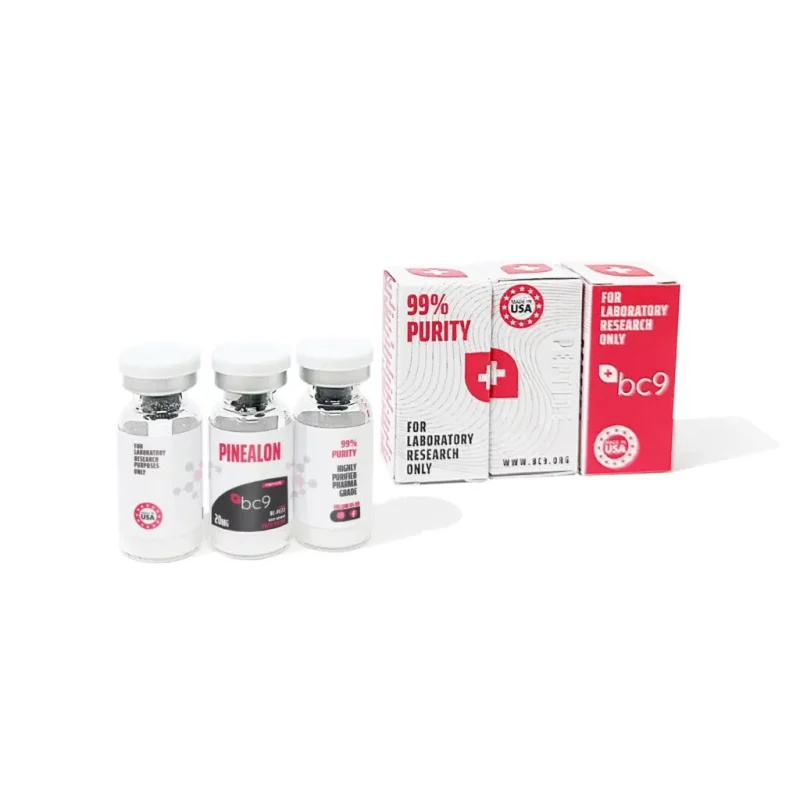Health & Fitness, Medicine
How Pinealon Works: Peptide Research on Memory, Focus, and Nerve Health
Understanding Pinealon: A Neuroprotective Tripeptide
Pinealon is a short peptide composed of three amino acids — Glu–Asp–Arg — that plays a significant role in the regulation of gene expression, neural repair, and cognitive function. Developed through extensive peptide bioregulation research, Pinealon has been studied for its ability to protect nerve cells from oxidative stress, regulate neurotransmitter balance, and enhance cognitive performance.
The pinealon peptide research highlights its potential as a neuroprotective compound that supports the body’s natural mechanisms for maintaining neuronal integrity and brain homeostasis, particularly in conditions related to aging, stress, and neurodegeneration.
Molecular Mechanism: How Pinealon Works at the Cellular Level
At the molecular level, Pinealon exerts its effects through epigenetic modulation and antioxidant activity. Studies suggest that this peptide can influence the expression of genes involved in apoptosis (cell death), mitochondrial stability, and synaptic plasticity.
- Mitochondrial Regulation: Pinealon optimizes mitochondrial energy production, reducing reactive oxygen species (ROS) accumulation that leads to oxidative stress and neuronal damage.
- DNA Protection: It safeguards DNA from oxidative degradation, enhancing cellular resilience in neurons and glial cells.
- Neurotransmitter Balance: Pinealon supports the synthesis and regulation of neurotransmitters such as dopamine and acetylcholine, which are essential for learning, memory, and emotional stability.
Pinealon and Neuroprotection: Shielding the Brain from Oxidative Damage
Oxidative stress plays a major role in the aging process and the progression of neurodegenerative diseases like Alzheimer’s and Parkinson’s. Pinealon acts as a bioregulatory peptide that mitigates oxidative damage and improves the brain’s adaptive response to environmental and metabolic stressors.
Research demonstrates that Pinealon can:
- Reduce lipid peroxidation, preventing damage to neuronal membranes.
- Normalize antioxidant enzyme activity, particularly superoxide dismutase (SOD) and catalase.
- Enhance neuronal survival, even under hypoxic or toxic conditions.
These properties make Pinealon an attractive subject in modern peptide-based neurotherapeutics.
Pinealon and Cognitive Function: Enhancing Memory and Focus
The pinealon peptide research suggests notable improvements in cognitive performance, particularly in tasks related to memory consolidation, mental clarity, and concentration. The peptide appears to optimize communication between neurons by stabilizing synaptic connections and supporting the formation of new neural pathways.
- Short-Term Memory Support: By improving synaptic signaling and acetylcholine balance, Pinealon enhances the brain’s short-term information retention.
- Long-Term Cognitive Benefits: Its ability to protect neurons and DNA contributes to sustained cognitive sharpness, even under stress or aging-related decline.
- Improved Attention and Focus: Enhanced neurotransmitter regulation leads to greater mental endurance and clarity.
Pinealon and Nerve Regeneration: Promoting Neural Repair
Pinealon’s effects extend beyond neuroprotection to neural regeneration. The peptide has shown the ability to stimulate the expression of neurotrophic factors and growth-associated proteins, accelerating the repair of damaged neurons and supporting myelin regeneration.
- Axonal Repair: Stimulates protein synthesis for axonal regrowth.
- Synaptic Recovery: Restores damaged synaptic structures, improving neural communication.
- Neurotrophic Modulation: Encourages the release of brain-derived neurotrophic factor (BDNF), essential for neuroplasticity and regeneration.
These regenerative effects highlight Pinealon’s potential in supporting recovery from neurotrauma and cognitive decline associated with aging or disease.
Pinealon and Aging: A Peptide for Longevity and Brain Vitality
Aging is characterized by a gradual decline in mitochondrial function and increased oxidative damage. Pinealon counteracts these processes by improving energy metabolism and maintaining DNA integrity. The peptide’s anti-aging benefits stem from its influence on the brain’s biochemical environment and its ability to sustain cellular vitality.
Clinical and experimental studies have shown:
- Enhanced mitochondrial energy output.
- Reduced accumulation of oxidative byproducts.
- Delayed onset of age-associated memory impairment.
By stabilizing neuronal metabolism, Pinealon supports healthy cognitive longevity and helps maintain optimal brain performance through the aging process.
Pinealon in Research: Clinical and Experimental Findings
Extensive pinealon peptide research has been conducted in both animal and human studies. Findings suggest that Pinealon can serve as a neuroprotective and nootropic peptide with a wide range of potential applications.
Key experimental outcomes include:
- Improved cognitive function in elderly subjects.
- Enhanced resilience to oxidative and hypoxic stress.
- Normalized neuronal activity in models of neurodegeneration.
- Protective effects against cerebral ischemia and oxidative injury.
Researchers continue to explore Pinealon’s role in neurodegenerative disease prevention, cognitive rehabilitation, and general brain health optimization.
Potential Applications of Pinealon Peptide
| Application Area | Research Insights | Potential Benefits |
| Cognitive Enhancement | Increases focus and memory retention | Better learning capacity |
| Neuroprotection | Protects neurons from oxidative and hypoxic stress | Reduces risk of neurodegeneration |
| Anti-Aging Therapy | Regulates gene expression and energy metabolism | Supports long-term brain vitality |
| Neural Regeneration | Stimulates neurotrophic activity | Promotes neural repair and recovery |
| Stress Adaptation | Modulates cortisol and neurotransmitter balance | Enhances mental resilience |
Conclusion: The Future of Pinealon Peptide Research
The growing body of pinealon peptide research underscores its promise as a multifunctional compound for brain protection, cognitive enhancement, and longevity. By supporting mitochondrial health, DNA integrity, and neurotransmitter balance, Pinealon offers a scientific pathway toward optimized neural performance and resilience.As interest in bioregulatory peptides expands, Pinealon stands at the forefront of neuropeptide innovation a potential bridge between neuroscience, longevity, and cognitive optimization.





















